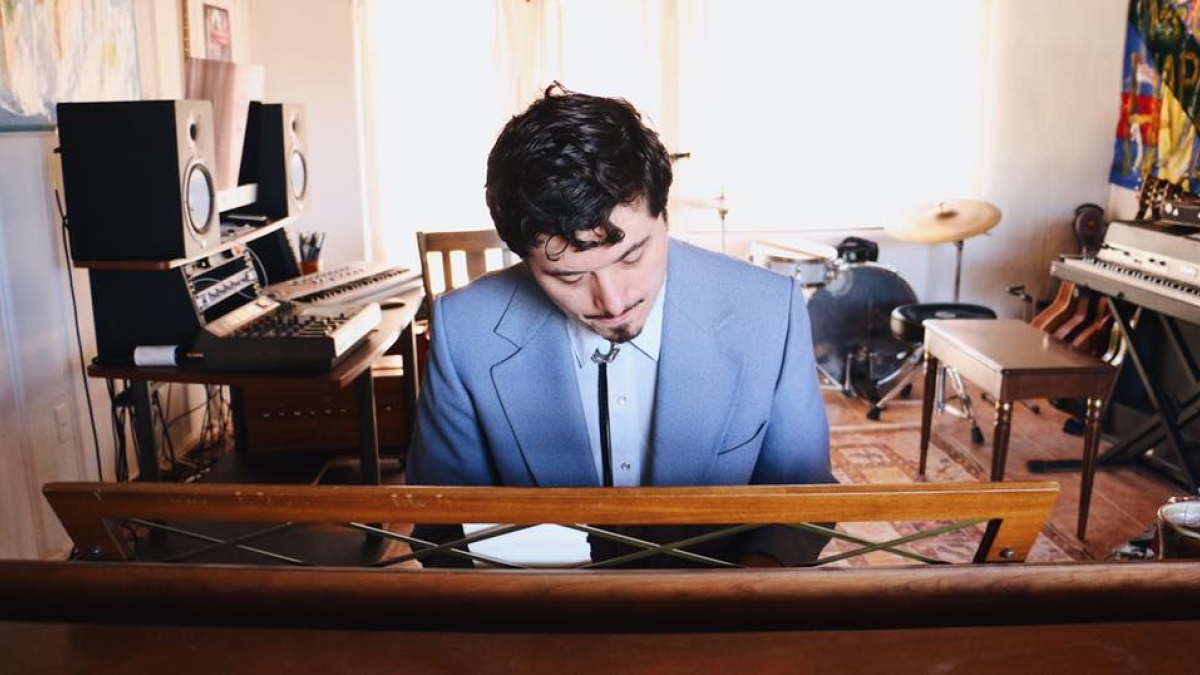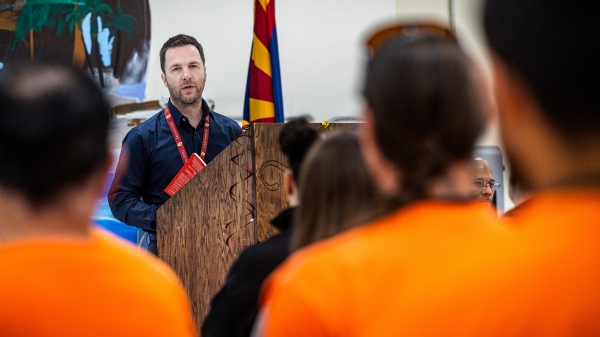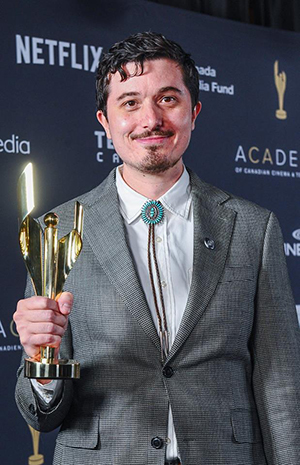Music alum wins Canadian Screen Award for best original song

Composer Joshua Hill.
Arizona State University School of Music alumnus Joshua Hill is the recipient of the 2018 Canadian Screen Award for best original song for his work on the 2017 animated feature film “The Breadwinner.” Hill wrote the lyrics for “The Crown Sleeps,” a song featured in the Academy Award-nominated film, which was produced by actress and humanitarian Angelina Jolie.
The music for the song was written by Afghan Rabab player Qais Essar, also an ASU alumnus. The film received a total of four Canadian Screen Awards: best original song, best score, best adapted screenplay and best sound editing.
Hill, composer and multi-instrumental performer, graduated from ASU in 2012 with a Bachelor of Music degree in music theory and composition.
“Josh distinguished himself as a different and unique individual from the start,” said Jody Rockmaker, associate professor in composition and theory in the School of Music in ASU’s Herberger Institute for Design and the Arts. “A standard question we ask all applicants to the composition program is, ‘Who’s your favorite composer?’ Most young applicants reply with Bach or Mozart or a film composer such as John Williams. Josh stated, ‘Well, I’m starting to get into the music of György Ligeti. I’d really like to learn about how he writes music.’ We knew then we were dealing with a different type of high school student.”
In addition to songwriting, Hill has started working with Michael Krassner and the Boxhead Ensemble scoring films. He is currently involved with an Arizona Commission on the Arts grant project where he is shadowing the Wooster Group, an New York City-based experimental theater company.
Hill released an album in February titled "Jon Cash and the Transfiguration of Merlin" that is available for streaming or purchase at joshuahillmusic.com.
ASU Now talked to Hill about his inspirations and what advice he'd give current music students.
Question: What was your “aha” moment, when you realized you wanted to study music theory and composition?
Answer: I didn’t know how to compose music or that I could study composition until I attended the Berklee College of Music summer camp in Boston. I knew I did not enjoy playing classical violin and was looking for other avenues for performance. After listening to jazz, I wanted to learn how to play jazz on violin. I also didn’t want to go to college until I met a student at Berklee who was applying to study composition. The idea of composing music seemed intriguing so I invested in music notation software, took theory classes and, with the help of some mentors, started digging into the world of 20th-century classical composition.
Q: Was there an important event or experience at ASU that influenced you or changed your perspective about music?
A: I was really depressed my first semester at ASU. I had trouble making friends, was missing classes and failing to complete homework. I failed music theory and was confronted by one of my composition instructors about my overall performance. It was one of those tough-love moments that really turned me around. I started taking my studies seriously, became more open to feedback and really began to embrace my collegiate experience.
The biggest event that changed my perspective on music was the first time I performed in Jacob Adler's "Otoacoustic Emissions," a 90-minute improvised work for musicians that begins in simplicity and slowly grows into glorious dissonant chaos. "Otoacoustic Emissions" changed the way I thought about sound and composition — to take a step back from creating sound and re-examine my motives for creating art.
Composer Joshua Hill at the Canadian Screen Awards.
Q: What have you learned in our school that helped you with challenges in your music career?
A: I had many divergent interests at ASU and had to learn how to forge my path while remaining flexible enough to experiment. I spent time playing in gamelan, string quartets, African drums, theater, dance, jazz combos, baroque ensemble and had a band. I learned to organize performances of my compositions, learned about grant writing and learned to be open to working in many different artistic mediums. Aside from music, I studied Arabic and spent a few summers in the Middle East studying Arabic and teaching/performing music. Perseverance, flexibility and openness are the biggest lessons I learned at ASU.
I want to acknowledge the professors in the School of Music who have stuck with me post-university — Jody Rockmaker, Kimberly Marshall, Lynne Aspnes, Michael Kocour, Ted Solis, Jonathan Swartz, Mark Sunkett and Glenn Hackbarth.
Q: What’s the best piece of advice you can give to those still in college?
A: Your professors, your friends and all the folks you interact with in your collegiate experience will teach you many things. Know how to open yourself up to learn, but keep sight of who you are. Your being human is the most important thing; cherish it. Lastly ... experiment, take risks and spend as much time as possible in Organ Hall.
"The Breadwinner" is available for viewing on Netflix.
More Arts, humanities and education

ASU professor, Arizona inmate work to rehabilitate the 'imprisoned mind'
An Arizona State University professor has collaborated with an Arizona inmate on a book that examines why investing in healing…
Illuminating legacy at ASU
In 2020, the ASU Art Museum unveiled a groundbreaking installation, "Point Cloud (ASU)," by renowned artist Leo Villareal. The…

Name change for ASU's Mary Lou Fulton Teachers College reflects college's mission
Arizona State University’s Mary Lou Fulton Teachers College has a new name: the Mary Lou Fulton College for Teaching and Learning…


